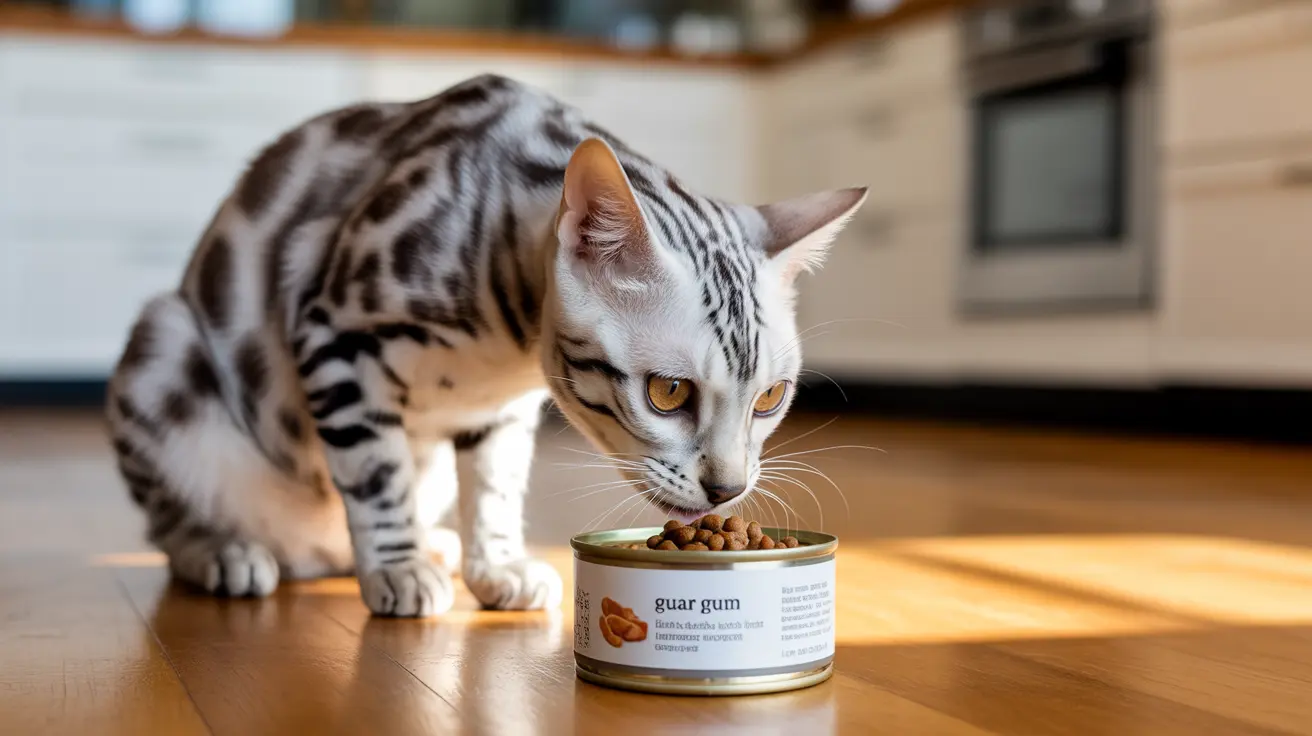What Is Guar Gum and Why Is It in Your Cat's Food?
Guar gum is a natural thickening agent derived from guar beans, primarily grown in India and Pakistan. In cat food manufacturing, it serves several important purposes:
- Maintains consistent texture in wet food
- Prevents separation of ingredients
- Improves food palatability
- Helps retain moisture
- Acts as a binding agent for other ingredients
Safety and Benefits of Guar Gum for Cats
Generally, guar gum is considered safe for cats when used in appropriate amounts (typically 0.5-1% of the food's composition). The FDA has designated it as Generally Recognized as Safe (GRAS), and it offers several benefits in commercial cat food production:
- Provides stable texture that cats find appealing
- Helps maintain even distribution of nutrients
- Reduces manufacturing costs compared to some alternatives
- Serves as a natural alternative to synthetic thickeners
Potential Risks and Concerns
While guar gum is generally safe, some cats may experience adverse effects:
- Digestive issues in sensitive cats
- Possible reduction in nutrient absorption
- Occasional allergic reactions
- Potential problems for cats with existing GI conditions
Special Considerations for Sensitive Cats
Certain cats may be more vulnerable to guar gum's effects:
- Cats with Inflammatory Bowel Disease (IBD)
- Senior cats with compromised digestion
- Cats with food sensitivities or allergies
- Those with existing gastrointestinal problems
How to Monitor Your Cat's Response to Guar Gum
Watch for these signs that might indicate sensitivity to guar gum:
- Changes in stool consistency
- Decreased appetite
- Increased vomiting
- Digestive discomfort
- Unusual lethargy
Alternatives to Guar Gum in Cat Food
If your cat shows sensitivity to guar gum, consider these alternatives:
- Natural food without thickeners
- Products using carrageenan or xanthan gum
- Home-prepared diets (with veterinary guidance)
- Prescription diets formulated for sensitive stomachs
Frequently Asked Questions
Is guar gum safe for all cats, or can it cause digestive issues in some?
While guar gum is generally safe for most cats, some individuals may experience digestive issues, particularly those with sensitive stomachs or existing GI conditions. The majority of healthy cats tolerate it well in commercial pet food amounts.
How does guar gum affect nutrient absorption in cats, especially protein and fat?
Guar gum can potentially impact nutrient absorption, particularly in higher concentrations. Studies suggest it may slightly decrease protein and fat absorption, though this effect is typically minimal at the levels used in commercial cat foods.
What are the signs that my cat might be sensitive or allergic to guar gum in their food?
Signs of guar gum sensitivity may include diarrhea, vomiting, decreased appetite, bloating, or general digestive discomfort. If you notice these symptoms, consult your veterinarian and consider switching to a food without guar gum.
Should I avoid cat foods with guar gum if my cat has inflammatory bowel disease (IBD) or other GI problems?
Cats with IBD or other gastrointestinal conditions may benefit from avoiding guar gum, as it could potentially exacerbate their symptoms. Consult with your veterinarian about appropriate food choices for your cat's specific condition.
What alternatives to guar gum are available in wet cat foods, and are they safer for sensitive cats?
Alternative thickeners include carrageenan, xanthan gum, and agar-agar. However, each carries its own potential benefits and risks. Some cats may do better with foods that don't contain any thickeners at all. The best choice depends on your individual cat's needs and sensitivities.
Conclusion
While guar gum is generally safe for most cats, it's important to monitor your pet's response to foods containing this ingredient. If you notice any adverse reactions, consult your veterinarian about alternative options. Remember that each cat is unique, and what works for one may not work for another.






